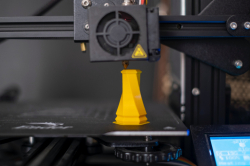Falcon Heavy launch skyrockets radio-resistant astronaut research. A massively-collaborative paper proposes the roadmap for making humans more resistant to radiation and multiple other forms of stress- and age- associated damage as humans race towards exploring other planets and deep space.
Energy-saving optical receiver sets record with rapid power on/off time. A group of researchers from IBM Research as part of the project "ADDAPT" have demonstrated a novel optical receiver (RX) that can achieve an aggregate bandwidth of 160 Gb/s through four optical fibers. This is not only the fastest data transmission speed to date, but the newly developed optical receiver also features the link power-on/off functionality and can wake-up and achieve phase-lock in eight nanoseconds, the shortest switch time in record.
Mind-reading algorithm uses EEG to reconstruct images. A new technique developed by neuroscientists at the University of Toronto Scarborough can reconstruct images of what people perceive based on their brain activity gathered by EEG. Researchers hope it could provide a means of communication for people who are unable to verbally communicate, among other applications.
Wearable tech goes nano. University of British Columbia team has built a smart wearable device that is capable of sensing and understanding complex human motion using graphene nano-flakes and rubber-like adhesive. To demonstrate the concept, they created a wristband that monitors heartbeats by sensing the pulse of the artery, and the finger and knee bands that monitor gestures and larger scale muscle movements during walking, running, sitting down and standing up.
Diet can reduce risk of depression. People who eat vegetables, fruit and whole grains may have lower rates of depression over time. The DASH diet recommends fat-free or low-fat dairy products and limits foods that are high in saturated fats and sugar. Studies have shown health benefits such as lowering high blood pressure and bad cholesterol (LDL), along with lowering body weight.




